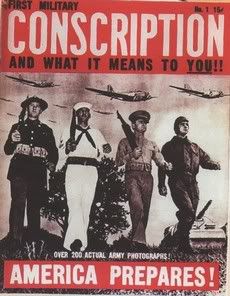Mr. 'H'
Call Me a Cab
- Messages
- 2,110
- Location
- Dublin, Ireland, Ireland

During a recent discussion on Americans joining the war effort in WWII someone expressed an opinion to me that most people didn't want to volunteer for WWII service, but entered because of the draft.
This seems contrary to what I know about that time. I mean - according to one of the 101st vets - two guys had killed themselves when they were 4F'd.
Does anybody have reliable information or concrete sources about attitudes on going into the service, especially in the immediate post Pearl Harbor period?
I'm aware of the usual suspects, i.e. conscientious objectors, American communists but I'd like to get reliable sources of what the main body of men felt on this issue of volunteering vs. drafted.



